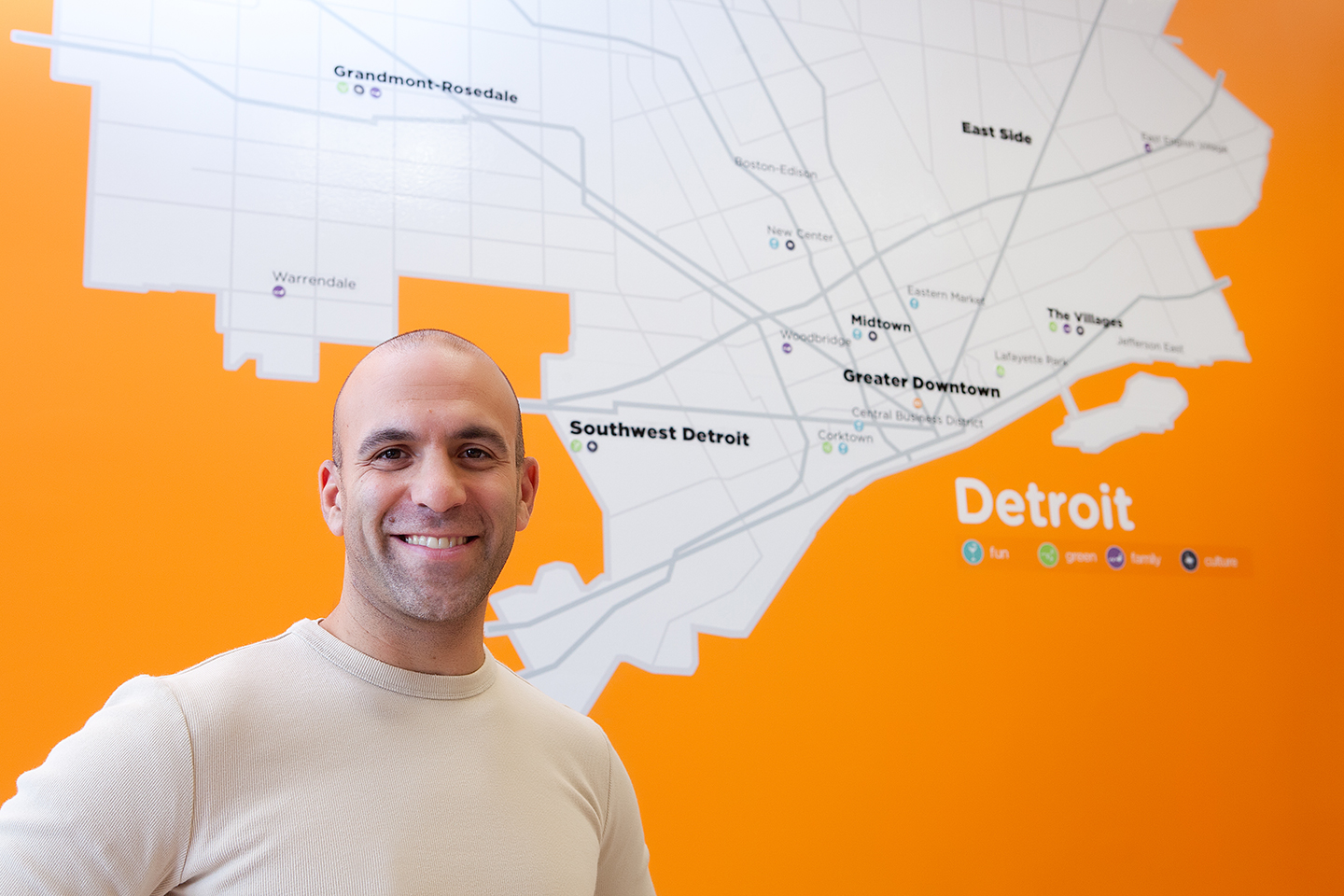by Vivian Henoch
What does it take to get from point A to B, from a good business idea to a living, thriving company? Ask Jeff Aronoff, the man at the very heart and center of D:hive. A welcome center and hub of activity, D:hive helps people find work, places to live, resources and connections in the city.
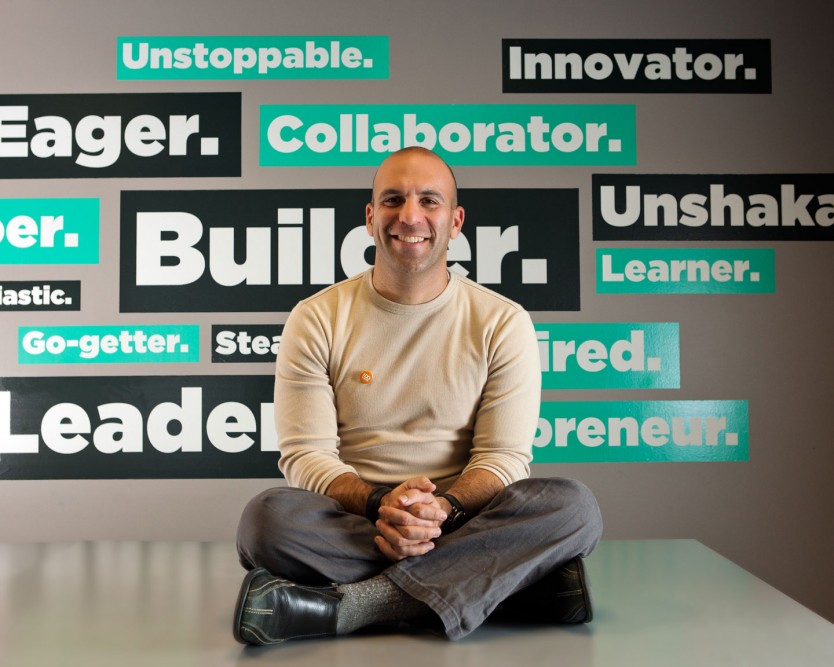
After seven years in the practice of law, specializing in public finance and economic development, Jeff took a leap of faith to help launch D:hive as its first Executive Director. Located at 1253 Woodward Avenue, D:hive is a project of the Downtown Detroit Partnership, with support from the Hudson-Webber Foundation, Quicken Loans/Rock Ventures, Model D Media, Detroit Economic Growth Corporation and others.
Jeff, who still considers himself a Tamarack kid, is a board member of the Jewish Community Relations Council and Federation’s NEXTGen. Along with his wife, Tracy, Jeff is an active supporter of Tamarack Camps and the Isaac Agree Downtown Synagogue. The Aronoffs live in Huntington Woods with their two young sons.
On Community Involvement
MyJewishDetroit: You have described yourself as a Tamarack kid. How has your family history growing up in Metro Detroit influenced the paths you’ve taken in “bringing fire to the camp” so to speak — building community through D:hive?
I didn’t grow up in the city proper, but I think anyone who has taken a stand against Detroit’s so called “brain drain” and resisted the temptation to leave the city feels a sense of pride in becoming a part of Detroit’s venture into a new identity.
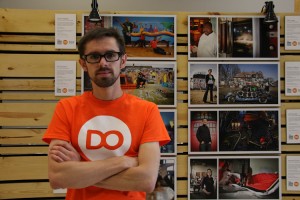
Those who have stayed in this area have done so, not only out of a sense of loyalty, but also out of a sense of adventure. It’s exciting to be part of creating something new, right?
You can move to other cities and just fall into place; it’s all there for you. Maybe in the short term that can be exciting, but in the long term it’s not as rewarding.
Detroit has always been an essential part of my work-life. When I was in my law practice, I did a lot of work relating to the infrastructure and dynamics of the city. By running D:hive, I now have the opportunity to “kick it up a notch” and engage in the city in a different light.
On D:hive and Detroit startups
MyJewishDetroit: Project for Public Spaces, Shop Detroit, Heidelberg. . . you have your finger on the pulse of Detroit initiatives, projects and causes too numerous to mention. What inspired you to start D:hive? How has your vision for D:hive developed or changed?
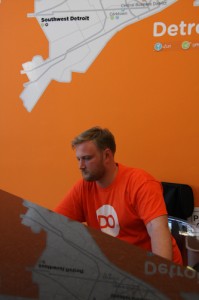 Let me start by saying I didn’t invent this. D:hive was the result of a fortunate chain of events: the Hudson-Webber Foundation and a few others in town came in contact with Josh McManus, an internationally recognized urban consultant – a solver of city problems – known for groundbreaking work in Chattanooga, Tennessee and other places. Hudson-Webber was impressed by Josh’s work and asked him to come to Detroit to develop a set of recommendations and a framework for something new and pioneering in the city.
Let me start by saying I didn’t invent this. D:hive was the result of a fortunate chain of events: the Hudson-Webber Foundation and a few others in town came in contact with Josh McManus, an internationally recognized urban consultant – a solver of city problems – known for groundbreaking work in Chattanooga, Tennessee and other places. Hudson-Webber was impressed by Josh’s work and asked him to come to Detroit to develop a set of recommendations and a framework for something new and pioneering in the city.
Josh moved to Detroit, did exhaustive research for about six months and concluded that for a post-industrial city, we actually have a lot going for us. There are a lot of people here who want to reengage, who want to work here, or move back to the city. What Josh found to be missing was a central entry point, a place where people could access information and resources. Really it’s all about making connections.
Josh and I are both alumni of an international leadership exchange program called the Marshall Memorial Fellowship, and we had some common connections who suggested we meet while Josh was in Detroit. We started talking about his work, and we just clicked. We shared a vision, but the idea of my running D:hive was not even on the radar when we started talking. Josh actually sent me the job description and asked me to think about anyone in my network who might fit the bill. One thing led to another, and the next thing you know, I found someone in my very, very “immediate network.”
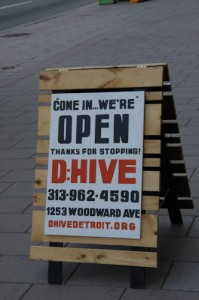 Walk into D:hive today and everything here looks permanent. But it’s meant to be a three-year experiment. After three years, we will assess whether we continue and what that might look like. I imagine that we’ll take some of the projects we’re working on now and parcel them off to find other permanent homes and funding for them. We try to maintain a sense of urgency in our work. We think of ourselves as launch pad – not necessarily a foundation.
Walk into D:hive today and everything here looks permanent. But it’s meant to be a three-year experiment. After three years, we will assess whether we continue and what that might look like. I imagine that we’ll take some of the projects we’re working on now and parcel them off to find other permanent homes and funding for them. We try to maintain a sense of urgency in our work. We think of ourselves as launch pad – not necessarily a foundation.
MyJewishDetroit: There’s always been synergy between the Jewish community and the greater Detroit community. As a board member of the JCRC and NEXTGen and a Detroit activist, how do you see your professional and volunteer roles converging?
The NEXTGen movement and the Downtown Synagogue are only two examples of many areas where Jewish energy meets Detroit energy. I try to be at the center of that dynamic in the community as much as possible, and I think that there is potential for more powerful synergies between the Jewish community and the transformation of Detroit.
At D:hive we partner with a lot of different people. However, when something comes across the radar as a part of a Jewish organization, I know it’s worth paying special attention – not only because it’s the Jewish community, but because I know how well our community organizes and puts together projects.
On work, play and life in the city
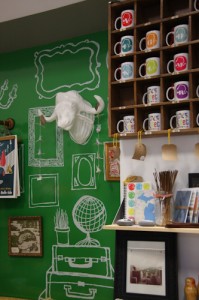
MyJewishDetroit: As a fervent Detroit-booster, what do you think makes Detroit a great place to live, work and play?
Right now there’s palpable energy in the business and philanthropic communities and people moving back to the city. We’re wide open for entrepreneurs and pioneers, those who are drawn by the adventure that is Detroit right now.
At some point we have to be the place for more people who just want a cool city. We need the critical mass. It’s not enough to have the leaders and early adopters. We need to welcome the next, probably less adventurous, wave of people. We need more places to live in the city. As we grow, we need to grow up, too, with more efficient retail and residential markets.
The beauty of Detroit right now is that there’s a high level of cooperation that exists between the corporate and philanthropic communities. In particular, the business community is really extraordinary in that we see competitors cooperating in a way that is unprecedented in the country. I think everyone realizes we need to grow the pie first before we cut the pieces.
MyJewishDetroit: What do you tell people considering moving back to Detroit or into the city for the first time?
I say keep an open mind and expect something different in Detroit. This is a city that can surprise you in really powerful and uplifting ways. Maybe some of the obvious amenities aren’t here yet, but there are opportunities here that you wouldn’t find anywhere else. And those are the better ones anyway, those are the most exciting ones.
On favorites
Restaurant: The Bucharest Grill – good for a quick lunch
Hangout for coffee: I don’t drink coffee, but love 1515 Broadway for tea. I’m a proud tea snob.
Building in the Detroit skyline: 150 West Jefferson, (four flags on the top), my old Miller Canfield offices. I’m very fond of that place.
Place to take kids: We’re Lions freaks, so for our family it’s gotta be Ford Field.
Jewish food: Kugel. “Cinnamon-y” kugel.
Jewish expression: Yasher Koach, yeh, I like hearing that.
Reading now: Zen and the Art of Motorcycle Maintenance, by Robert M. Pirsig (I was something of a slacker student in high school, and didn’t read it then. But I’ve picked up the book and read it three times since.)

